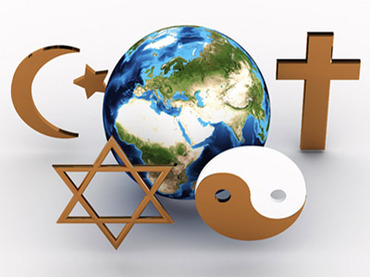
Washington, December 19: Hinduism is the third largest religion of the world after Christianity and Islam and 97 per cent of all Hindus live in three Hindu-majority countries – India, Nepal and Mauritius, according to a study.
India, which accounts for majority of world's Hindus, is also home to almost all the major religions of the world, a Pew research said Tuesday.
Pew demographic study – based on analysis of more than 2,500 censuses, surveys and population registers – finds 2.2 billion Christians (32 per cent of the world's population), 1.6 billion Muslims (23 per cent), 1 billion Hindus (15 per cent), nearly 500 million Buddhists (seven per cent) and 14 million Jews (0.2 per cent) around the world as of 2010.
In addition, more than 400 million people (six per cent) practice various folk or traditional religions, including African traditional religions, Chinese folk religions, Native American religions and Australian aboriginal religions.
An estimated 58 million people – slightly less than one per cent of the global population – belong to other religions, including the Baha'i faith, Jainism, Sikhism, Shintoism, Taoism, Tenrikyo, Wicca and Zoroastrianism, to mention just a few, it said.
Pew said overwhelmingly, Hindus and Christians tend to live in countries where they are in the majority.
Ninety seven per cent of all Hindus live in the world's three Hindu-majority countries (India, Mauritius and Nepal), and nearly nine-in-ten Christians (87 per cent) are found in the world's 157 Christian majority countries.
The median age of two major groups – Muslims (23 years) and Hindus (26) – is younger than the median age of the world's overall population (28), it said adding that all the other groups are older than the global median.
Christians have a median age of 30, followed by members of other religions (32), adherents of folk or traditional religions (33), the religiously unaffiliated (34) and Buddhists (34).
Jews have the highest median age (36), more than a dozen years older than the youngest group, Muslims.
Hinduism, the study said, is the most geographically concentrated of the eight religious groups analysed in this report. Less than one per cent of Hindus live outside Asia and the Pacific.
India, the report said is home to 11 per cent of the world Muslim population – the second largest after Indonesia.
The 10 countries with the largest number of Muslims are home to fully two-thirds (66 per cent) of all Muslims.
The largest share lives in Indonesia (13 per cent), followed by India (11 per cent), Pakistan (11 per cent), Bangladesh (8 per cent), Nigeria (5 per cent), Egypt (5 per cent), Iran (5 per cent), Turkey (5 per cent), Algeria (2 per cent) and Morocco (2 per cent).
Muslims make up a majority of the population in 49 countries.
Nearly three-quarters of all Muslims (73 per cent) live in these countries.
Although Muslims are a minority in India (14 per cent of the total population), India nonetheless has one of the largest Muslim populations in the world.
Pew said India has the largest share (47 per cent) of all members of other religions, including millions of Sikhs and Jains.
Outside India, the largest shares of people who belong to faiths in the "other religion" category are in China (16 per cent), Japan (10 per cent), Taiwan (7 per cent), North Korea (5 per cent) and the United States (3 per cent).





Comments
Add new comment